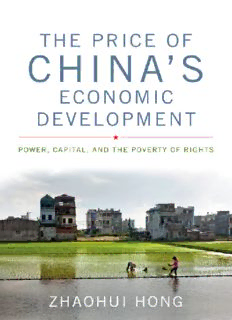
The Price of China's Economic Development: Power, Capital, and the Poverty of Rights PDF
Preview The Price of China's Economic Development: Power, Capital, and the Poverty of Rights
The Price of China’s Economic Development ThE PriCE of China’s EConomiC DEvEloPmEnT ★ Power, Capital, and the Poverty of rights Zhaohui hong Due to variations in the technical specifications of different electronic reading devices, some elements of this ebook may not appear as they do in the print edition. Readers are encouraged to experiment with user settings for optimum results. Copyright © 2015 by The university Press of Kentucky scholarly publisher for the Commonwealth, serving Bellarmine university, Berea College, Centre College of Kentucky, Eastern Kentucky university, The filson historical society, georgetown College, Kentucky historical society, Kentucky state university, morehead state university, murray state university, northern Kentucky university, Transylvania university, university of Kentucky, university of louisville, and Western Kentucky university. all rights reserved. Editorial and Sales Offices: The university Press of Kentucky 663 south limestone street, lexington, Kentucky 40508-4008 www.kentuckypress.com library of Congress Cataloging-in-Publication Data hong, Zhaohui, 1959– The price of China’s economic development : power, capital, and the poverty of rights / Zhaohui hong. pages cm. — (asia in the new millennium) includes bibliographical references and index. isBn 978-0-8131-6115-0 (hardcover : alk. paper) — isBn 978-0-8131-6116-7 (pdf) — isBn 978-0-8131-6117-4 (epub) 1. Economic development—China. 2. human rights—China. 3. China—social conditions—1949– 4. China—Economic conditions—1949– 5. China—Politics and government—1949– i. Title. hC427.95.h68155 2015 338.951—dc23 2015006202 This book is printed on acid-free paper meeting the requirements of the american national standard for Permanence in Paper for Printed library materials. manufactured in the united states of america. member of the association of american university Presses To lan, nicole, and Emma Contents introduction. a Tale of Two Chinas: Power-Capital China and rights-Deprived China 1 Part I. The Power-Capital Institution: The Haves 1. Economy: The marriage between Power and money 25 2. Entrepreneurs: from “red Capitalists” to intellectual Elites 39 3. Political Culture: Combining Tradition and innovation with “Chinese Characteristics” 59 Part II. The Poverty of Rights: The Have-Nots 4. urban China: The forgotten Corners 89 5. rural China: The Divested farmers 107 6. migrant laborers: from Economic Deprivation to social segregation 127 7. Protestant house Churches: from legal Exclusion to religious repression 159 Conclusion: The linkage between the Power-Capital institution and the Poverty of rights 193 acknowledgments 201 notes 205 selected Bibliography 259 index 281 Introduction A Tale of Two Chinas: Power-Capital China and Rights-Deprived China it has been more than thirty-five years since China embarked on a road of economic reform and modernization that has led to the most dramatic economic development, social transformation, and cultural metamorpho- sis in its five-thousand-year history. China’s rapid development has chal- lenged established theories about economic modernization, which do not seem applicable to the peculiar Chinese situation.1 The last few decades have seen a great number of in-depth studies on China’s economic development. however, while the world is recognizing and marveling at China’s economic accomplishments, few, if any, works have examined the social and cultural price of the nation’s economic devel- opment in a systematic and comprehensive fashion. analyzing a series of puzzling and seemingly incomprehensible phenomena generated by the process of China’s economic development requires all interested scholars to make an effort at mapping China’s development and in interpreting the progression of human civilization as a whole. This book will discuss the price of Chinese economic development, focus- ing on social and cultural consequences since 1978 from historical and com- parative perspectives. it will provide a comprehensive account of how much China has paid to reach its current stage of development. The perception of the “China miracle” or “China model” is incomplete if the price of economic development is ignored, miscalculated, misperceived, or misinterpreted.2 overall, the book will concentrate on the institutional costs, social price, and cultural consequences of China’s economic development since 1978. 1
Description: